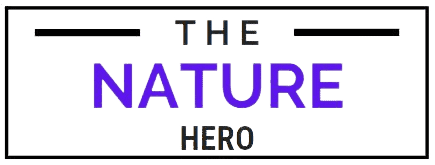Do you use ChatGPT to generate and correct codes? Then, you must know about Codex, which runs the same GPT technology but entirely for coding.
While OpenAI developed both technologies, their respective functions and applications differ.
Continue reading to learn the differences and similarities between ChatGPT and Codex.
Table of Contents Show
What Is ChatGPT, and How Does It Work?
ChatGPT is a natural language model developed by OpenAI Lab based on deep learning techniques to generate human-like responses to natural language queries.
Therefore, you can ask anything to ChatGPT, and it will provide you with the most relevant and assertive answer in the perceivable language.
Here is an example: I asked ChatGPT to explain quantum physics as I am five years old.
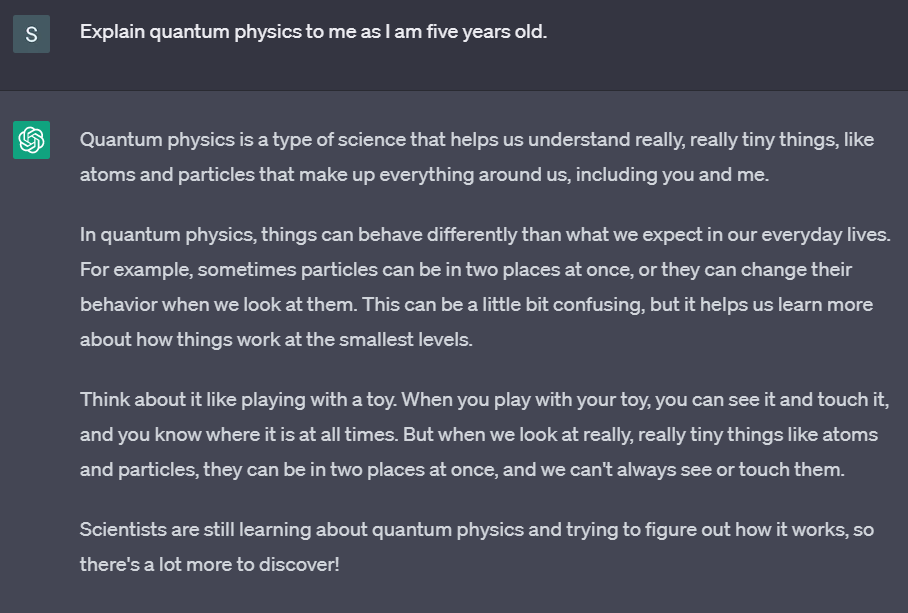
Some of its unique features include:
- Natural Language Processing: It understands natural language queries and generates grammatically correct and semantically meaningful responses.
- Personalized Responses: It learns from previous interactions and personalizes its responses based on the context and user history.
- Multi-Turn Conversations: It handles multi-turn conversations, allowing users to ask follow-up questions and engage in more complex interactions.
- Domain-Specific Conversations: It can be fine-tuned on specific domains, providing more accurate and relevant responses to particular industries or topics.
- Open Source: The code for ChatGPT is open source, meaning developers can customize and modify it to suit their specific needs and applications.
ChatGPT is solely based on Generative Pre-trained Transformer (GPT) architecture and billions of parameters.
It processes an input, analyzes the meaning, and produces a coherent response, as shown in this diagram.
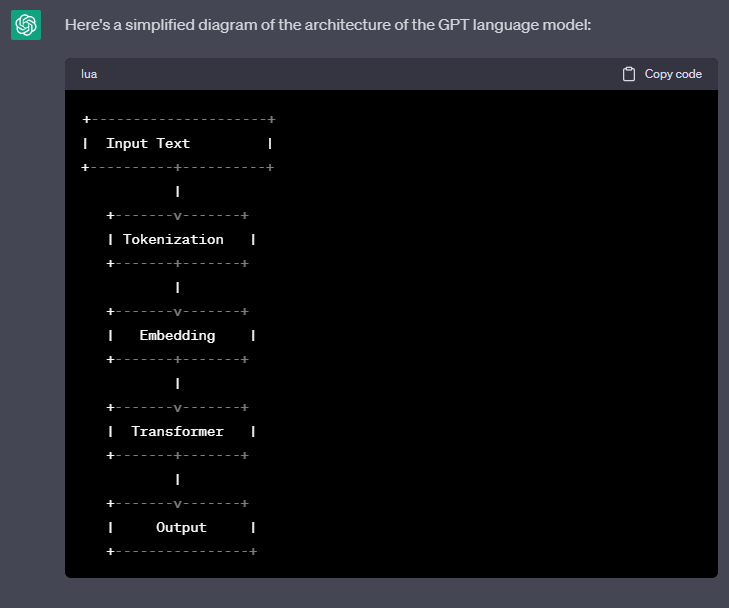
Did you know the latest GPT version, GPT-4, was recently released and is accessible to plus or paid users?
What Is Codex And How Does It Work?
OpenAI Codex is a state-of-the-art language model developed by OpenAI to generate code and perform natural language processing tasks.
Unveiled in 2021, it is based on the GPT architecture, but unlike ChatGPT, it is selectively trained on a large corpus of programming code and natural language text.
Here is an example of Codex generating a response on javascript.
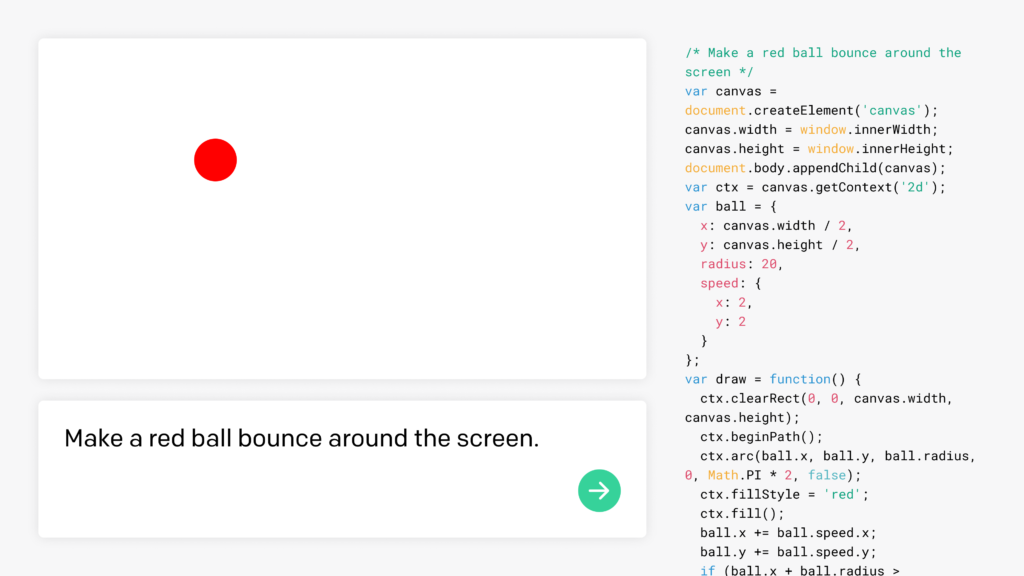
OpenAI Codex has significant potential in various industries, including software development, data analysis, and automation.
Some of its unique features include:
- Code Generation: OpenAI Codex generates code in various programming languages based on natural language inputs from the user.
- Natural Language Processing: It understands and responds to natural language queries, allowing users to interact with it using human-like language.
- Speed And Efficiency: It generates code quickly and accurately, making it a valuable tool for developers who need to write code fast.
- Integration With Development Tools: It has been integrated into several development tools, including GitHub’s Copilot, allowing developers to write code more efficiently.
- Customizability: It can be fine-tuned on specific domains, providing more accurate and relevant code suggestions to particular industries or topics.
It is only available to API users, while free users can only access the sandbox version.
The Codex model does not exist as of March 2023, and OpenAI suggests using newer chat models.
ChatGPT Vs. Codex: Similarities
ChatGPT and Codex make natural language models trained on a large corpus of data, where they also boast similar architecture and models.
Apart from being the innovations of OpenAI lab, these two technologies share similarities and differences.
1. Based On GPT Architecture
ChatGPT and OpenAI Codex are based on the Generative Pre-trained Transformer or GPT architecture.
It is trained on large amounts of contextual text data to help provide comprehensible responses.
2. Uses Natural Language Processing
ChatGPT and Codex both use natural language processing techniques to understand and respond to queries.
Therefore, you will feel like talking to a human assistant instead of an AI. Moreover, you can follow up on the same questions without experiencing a disconnection.
3. Handle Complex Inputs
Both ChatGPT and Codex can handle complex inputs and generate accurate and relevant responses or code suggestions based on the context and user history.
If you are wondering, you can create an entire computer program using a particular programming language.
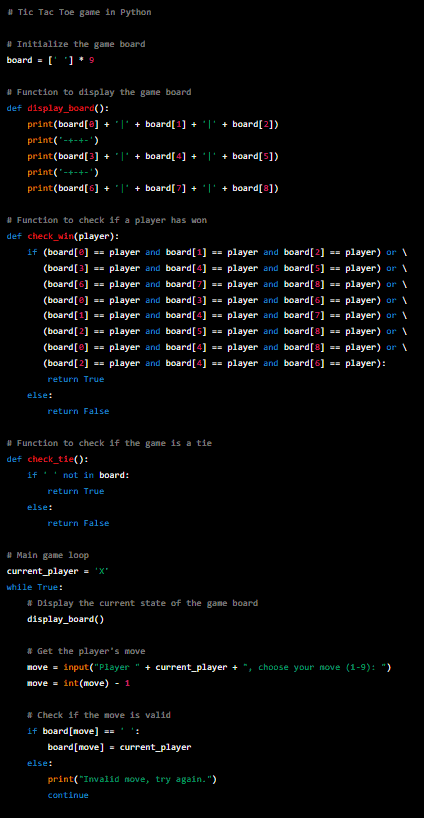
4. Ability To Fine-Tune
You can fine-tune them on specific domains, providing more accurate and relevant responses or code suggestions to particular industries or topics.
You can switch from one language to another simultaneously, as they know dozens of natural languages.
5. Continuously Learning
ChatGPT and OpenAI Codex are continuously learning models; they can improve their performance over time through exposure to more data and user feedback.
Therefore, you can find GPT-4 as the newest version of the available ChatGPT and text-davinci or Github Copilot as the latest alternative to Codex.
ChatGPT Vs. Codex: Major Differences
While these two OpenAI technologies share many similarities, they are pretty different in functionality and usage.
Here is a quick comparison between the two similar technology giants.
| Specifications | ChatGPT | Codex |
|---|---|---|
| Purpose | It is primarily designed for natural language processing and conversation. | It is solely designed for code generation, correction, and suggestions. |
| Input Type | It is designed to generate responses to natural language inputs. | It is designed to generate code based on natural language inputs. |
| Language Support | It can process and generate responses in a wide range of languages. | It supports a number of programming languages, such as Python, Java, and JS. |
| Training Data | It is trained on a large corpus of natural language text data. | it is trained on a combination of code and natural language text data. |
| API Access | It is available as a cloud-based API allowing integrate into applications. | It is available only through GitHub's Copilot, a plugin for the VS Code editor. |
| Fine-tuning | It can be fine-tuned on user-specific data to improve its responses. | It can be fine-tuned on specific domains to improve code generation for those domains. |
Here are the differences in detail.
1. Usage
ChatGPT is primarily designed for answering questions, generating ext, or holding conversations with humans.
On the other hand, Codex is solely designed to provide programming assistance, such as suggesting code, completing code snippets, diagnosing and correcting code problems, etc.
2. Training Data
The training model for the two AI technology is mainly different.
ChatGPT was trained on a large corpus of text from the internet, while Codex was trained on a vast amount of code from various sources such as GitHub, StackOverflow, and more.
3. Language Type
ChatGPT is fluent in generating text in natural as well as programming languages.
In contrast, Codex is limited to programming languages, C#, JavaScript, Go, Perl, PHP, Ruby, Swift, TypeScript, SQL, and even Shell.
4. Inputs and Outputs
ChatGPT takes natural language inputs such as questions, statements, or keywords and responds with text-based outputs.
In contrast, Codex takes programming language inputs such as function or variable names and returns code snippets or suggestions to complete the code.
5. Accuracy and performance
Their performance can vary depending on the complexity of the task or the input.
ChatGPT may struggle with complex programming tasks or specific programming language syntax, while Codex may not be as effective for generating human-like text responses.
Final Thoughts
ChatGPT and Codex illustrate the diverse applications and capabilities of advanced natural language processing and machine learning models.
Although they boast different applications, they are primarily interchangeable in a few aspects, especially coding.
As both AI models are available at your disposal, you should assess them and see what works best for you.
Frequently Asked Questions
Did OpenAI Discontinue Codex?
Open AI discontinued Codex as a standalone service, according to the official site of OpenAI.
However, users can still access its services through the latest code-generating OpenAI models, such as text-davinci and Github Copilot.
Is ChatGPT A Reliable Code Generation Tool?
It is a reliable code-generation tool, from creation, editing, and completion to correcting existing codes.
However, you should be careful about replicating the exact code into your system to prevent the risk of violating copyright.
